-
Spare Parts For The Mind by Greg Egan
The title of this novella is to be taken quite literally as it describes a near-future technology of small brain implants that has the potential to mitigate Alzheimer’s disease. The story follows Gordon in his recovery after getting the implants and how he and his family, and society, deals with this new technology.
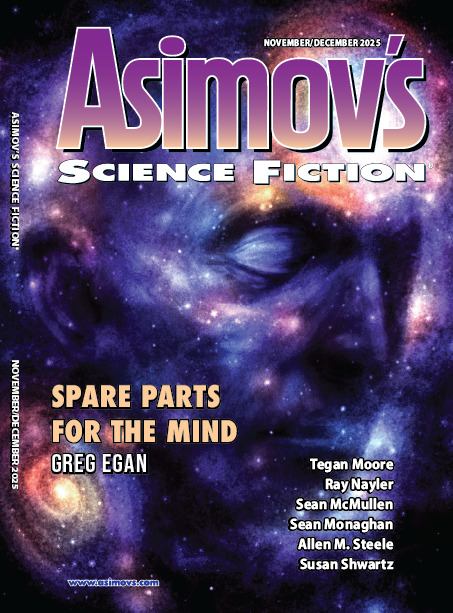
Near future speculations of technology that combines AI with neurotechnology is well known territory for Egan, most recently with Vouch For Me and Understudies, though this story is a lot less dramatic or plot heavy. We follow Gordon closely has he is getting himself reacquainted with his wife, family and his profession as a game inventor. The implants aren’t perfect as he often has social inappropriate outburst in public. They are already up to their ears in debt, so he seeks experimental treatment that should improve his current implants.
While this may not be Egan most groundbreaking work, it is always competently well written and it is how he handles what happens in the background that is interesting. While the story follows Gordon’s day to day struggle closely, we also learn that similar implants are also being adopted by healthy people. That trend is met with hostile scepticism as many don’t feel safe around people whose brain is partly controlled by AI. Which of course doesn’t make life easier for Gordon either.
As the current technological development of the last couple of years have already surpassed science fiction writer’s ideas from a decade or two ago, Egan shows that the genre is still relevant by dealing with the crossing lines between machine and human intelligence and what that does to us.
Read in Asimov’s November/December 2025
Rating: 4 -
For the Love by Marie Vibbert
I have been given free review access to The Daily Tomorrow, a new magazine of sorts for science fiction short stories. It works as a daily newsletter hosted on Substack, where subscribers get a short portion of a story every day and in a week the story is complete. This is an interesting approach to delivering short stories to readers through e-mail, so at first I tried that approach by reading the daily e-mail. However, that didn’t work for me at all. It was difficult only reading a handful of paragraphs with 24 hours in between, and maybe that particular wasn’t for my thing either. I could see the format working for flash fiction though. The good thing is that you don’t have to read it like that, as complete stories are available on the website, so I loaded this story instead onto my Kindle.
This story by Marie Vibbert taps into nostalgic media fandom, with a story about a young researcher in the future working on recovering historical artifacts who faces challenges when her project is in a danger of being closed due to budget cuts. In this case it is about old Dr. Who episodes, but the specifics aren’t that important for the story as such. It is a positive outlook on respect for our cultural history and a celebration of fan communities.
Read in The Daily Tomorrow, Issue 4
Rating: 2+ -
The Robot and the Winding Woods by Brenda Cooper
This was a nice little Simak-esque type of story about an elderly couple who has been working as park rangers for decades, but haven’t had any visitors in years. They are comfortable living by themselves without any contact to the outside world, while they keep upholding their ranger duties.
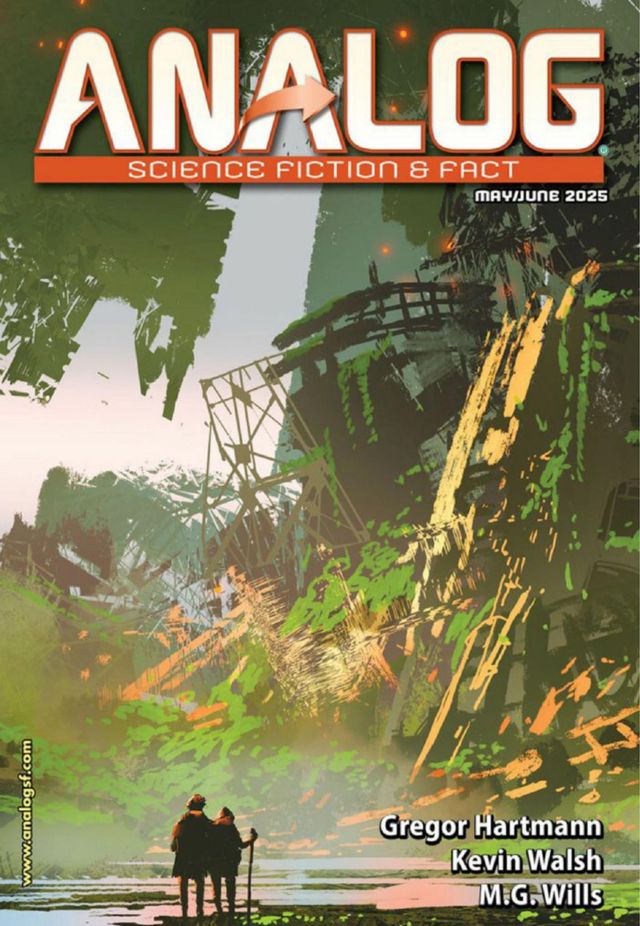
One day a humanoid robot drives up their driveway to inform them that they are no longer licensed to stay, and have to pack their things and leave the next morning. The two elderly rangers are not so keen on that idea.
What makes this story work is the world building we get a sense of in the background, without getting all the details. Through short conversations with the robot, we get a very interesting picture of the technological advancement and changes to society that has happened in the two decades the two ranges have been off the grid. A pleasant reed and a good example of a confined limiting setting being put to good use in the short story length.
Read in Analog May/June 2025
Rating: 3+ -
The Stone Played at Tengen by R.H. Wesley
The very first sentence in this well written short story establishes a simple yet mysterious premise, that hooked me right away. Set around the early 20th century Japan where 360 stars suddenly appear in the night sky, taking the form of a Go game board.
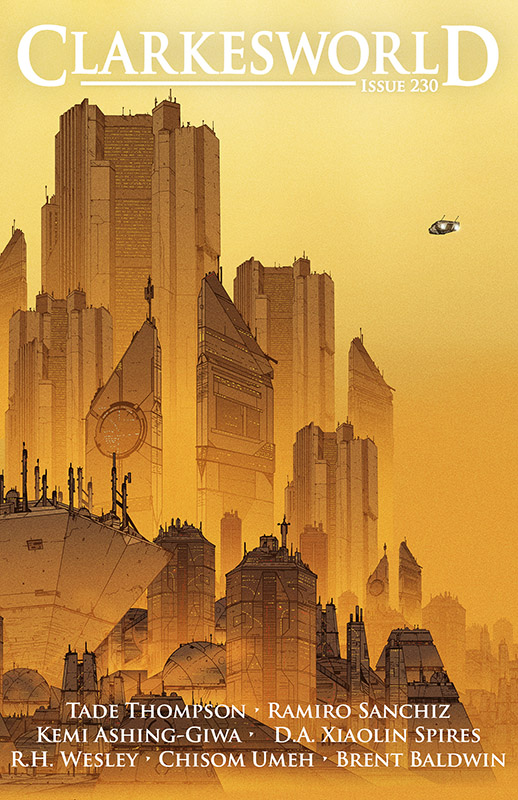
The locals are intrigued as it appears whoever is controlling the stars, has made an odd first move in Go - hence the title of the story. It isn’t considered a particularly good move, but the emperor wants to play the game with the celestial intelligence, so a group of Go experts is summoned for the challenge. Among them one that is known for previously making that unorthodox first move.
I don’t personally know anything about the game of Go, but the author clearly does and is successful in making the story engaging and interesting for everyone. The philosophical ramifications of what is going is clear enough.
The story is almost devoid of conflict and is sort of similar to first contact communication stories, but we don’t get any definitive answers. Not that the story needs it, as the mystery itself and how the game literally plays out makes for a great read.
Read in Clarkesworld November 2025
Rating: 4 -
Lagrange Point 5 by Sean McMullen
Sean McMullen delivers an entertaining classic “problem in space” type of story with the added complication of communication delays from long distances. With some sprinkles of media critique on top.

Follows a mission to a mysterious asteroid around the Lagrange point of Mars where odd readings have been spotted. Apparently some laws of physics doesn’t seem to apply there and there is a suspicion that it might involve ancient alien tech.
The story follows a second in command engineer onboard this mission and of course strange things happens, but the story is written in a way that makes the events be both terrifying and a little funny. As what makes this story stand out from the usual strange events from ancient alien tech type of stories, is how everything about the mission is catered to a near future social media reality. At times a little over the top with its rather stereotyped depiction of the influencer media landscape, which given the readership of this magazine will be just preaching to the converted.
It is far from McMullen’s best, but I was engrossed enough to read the story in one sitting - which doesn’t happen often for me these days.
Read in Asimov’s November/December 2025
Rating: 3+ -
Understudies by Greg Egan
Greg Egan delivers a story filled with math problems that manages to be entertaining despite me not following half of it, with a premise that is basically a 1:1 analogy of the potential impact on the job market from AI models.
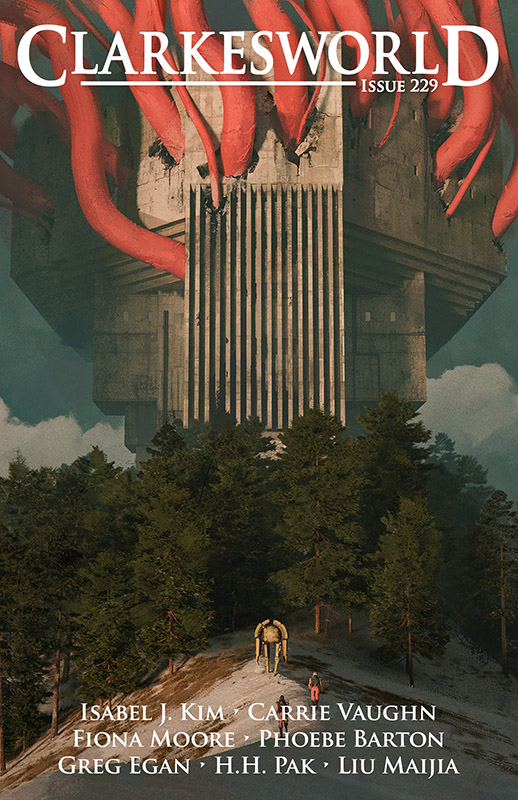
The premise of this story is a new technology called Cyranos that works sort of like an AI integrated in their brain. We follow Vince who gets the device, and Jamie who refrains from doing so. The two end up on different team in a math problem solving competition, which works to explore the different approaches and ethical themes on human intelligence versus AI-assisted problem solving.
The analogy to current AI models is easy to see here, and Egan makes good use of tricky math problems to show these differences. I honestly didn’t follow all of the math problems here, but Egan is great at making everyone understand the essence of what is going on, without the need to follow the exact deductions.
As such the story doesn’t provide any clear-cut conclusions on the limits to or threats from AI in the working economy, because there aren’t any, but the it does showcase how it relates to economic inequality and especially the potential shortcomings of AI when dealing with problems that have multiple best-case solutions with their own tradeoffs.
I don’t Egan quite reaches his normal high here, but I do hope he writes more stories dealing with LLMs, because I think his knowledge and skills as a science fiction writer is one that can give unique perspectives into that.
Read in Clarkesworld October 2025
Rating: 3+ -
Creative Destruction by Edward M. Lerner
Edward M. Lerner always delivers good quality science fiction entertainment and the first contact premise sounded interesting. I just only realised afterwards that it is a story set in his InterstellarNet, which explains why I generally liked the world building, but it felt a bit incomplete.
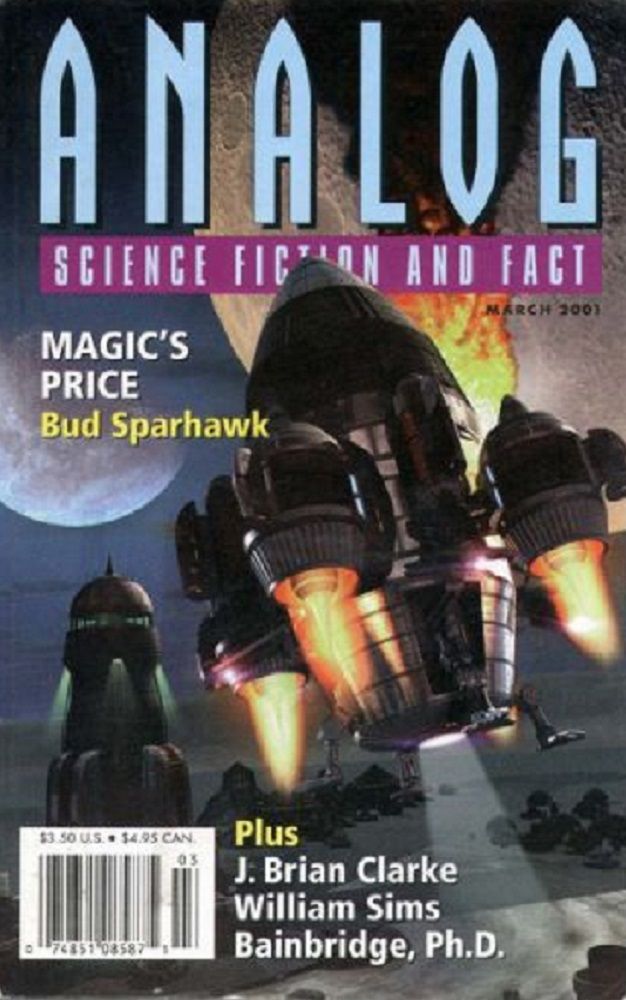
Set in a future where first contact has been made, but only through radio transmissions. The alien tech that has been revealed through that is of course highly valuable, and thus sought after by companies wanting to get ahead in the market, though regulations forbid them. The story follows a murder mystery narrative, but I was mostly drawn by the technical world building. Given the story’s age was sometimes a bit amusing, but also clearly shows that Lerner has a good eye for technological advancement.
This story is probably not the best introduction to this series of stories, as you are just thrown into the middle of things, but the world building shines through and I enjoyed that, though the actual story less so.
Read in Year’s Best SF 7, edited by David G. Hartwell
Originally published in Analog Science Fiction and Fact, March 2001
Rating: 3 -
In a Desolate Garden by Auston Habershaw
The concept of uploading a copy of a persons mind and sending it as a probe on an interstellar mission, is something I have seen couple of times before. The ambitious story here does make something original and profound from the premise.
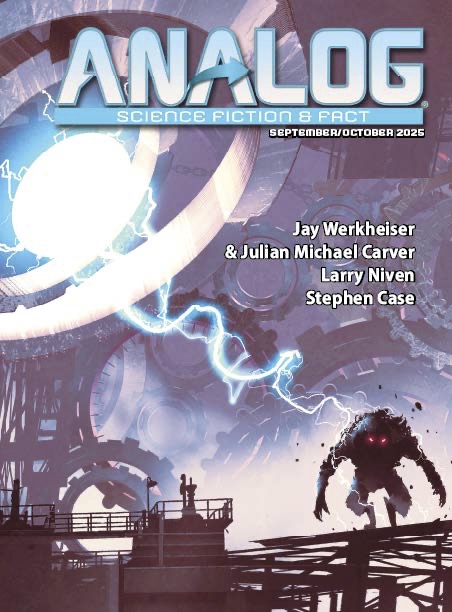
Married couple Claudia and Barton arrives at an exoplanet as “engrams” - artificial entities with a simplified version of their memories. Barton is extremely rich and is looking to buy the planet for them to live, hoping it will make Claudia happy. However, they encounter an alien entity that interferes with that plan.
The story is told from Claudia’s perspective and it is her inner thoughts that makes this story work so well. We don’t get all the details, but it is clear she wasn’t a happy person back on Earth and she isn’t exactly impressed with her husbands attempts at making her happy. She also acknowledges and is fully aware of her mental limitations as an artificial memory engram, which adds an extra layer of doubt to her decision making process.
The combination of high concept first contact and an emotional story makes this for a highly rated novelette in my opinion.
Read in Analog September/October 2025
Rating: 4 -
Tenth Contact by Bruce Sterling & Paul Di Filippo
As the title suggests, this is a bit of a different take on the first contact story. We follow three astronauts on tenth mission to Jupiter’s largest moon Ganymede. Previous missions have found fossil lifeforms and established a base on the moon.
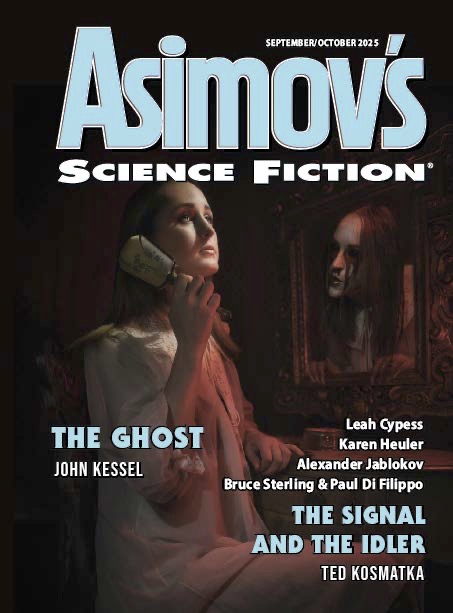
The three astronauts make some new groundbreaking discovery on the alien life on Ganymede, but simultaneously a galactic storm hits the solar system (sort of like a big solar flare with radiation) that wreaks havoc.
What hooked me with this story wasn’t the plot, and it almost takes a backseat, but the whole atmosphere, the characters and the world building around everything. Things aren’t overly explained, but we get a sense of how these astronauts have a certain “honor”-culture the abide by, which influences their choices. It is a rare thing to read a science fiction story that not only imagines a different technological future, but also how people might be different.
Read in Asimov’s September/October 2025
Rating: 4 -
Missing Helen by Tia Tashiro
The concept of this story is firmly established from the very first sentence. A divorced woman is getting told by her ex-husband that he is marrying her clone. Simple clear cut great science fiction premise, and the story is unfolding the consequences of such a scenario.
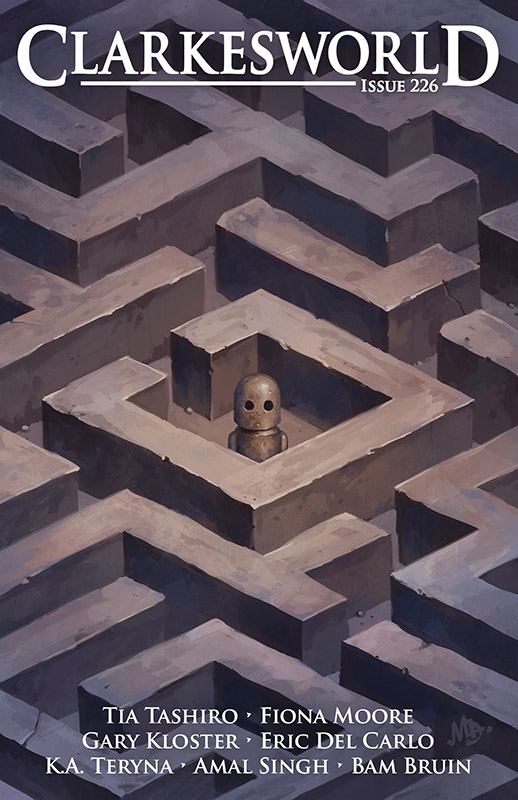
There are some flashbacks sequences explaining why she has a clone and the general “rules” for cloning. The gist of it is that she needed the money, and cloning is regulated in such a way that it is only allowed to make a single clone of a human - to avoid gene pool problems. You can then sell your clone to the highest bidder and it is forbidden to initiate contact with your clone afterwards.
Of course these two women meet each other and have some plausible conversations about nature versus nurture, personal identity, heritage and the usual “what if”-scenarios. It is all very well written and a fully convincing narrative for such a situation. However, for me the gist of all this still basically seemed like the stories you can read about with people meeting their long lost twin or unknown sperm donor. This is sort of a mix between the two, and for that it works. For me it didn’t bring much new to the table with this theme that hasn’t already been told by present reality.
Read in Clarkesworld July 2025
Rating: 3
- •
- 1
- 2